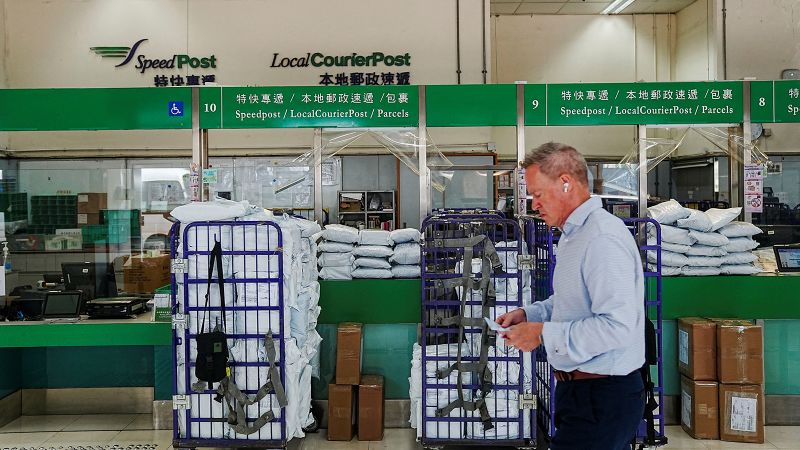In a significant development amidst the ongoing economic tensions between the United States and China, Hong Kong’s postal service, known as Hongkong Post, has decided to cease handling packages that either originate from or are sent to the United States. This action is perceived as a retaliatory measure against the backdrop of an intensifying trade war between the two global powers. The decision underscores the complexities of international trade relations, particularly as they pivot on tariffs and economic sanctions.
The announcement was made public on a Wednesday by the government of Hong Kong, which attributed its decision to recent policy changes by the US government, particularly under President Donald Trump’s administration. The catalyst for this abrupt move was Trump’s disbandment of the de minimis exemption that previously allowed shipments valued at $800 or less to enter the United States without incurring tariffs. This exemption served as an essential facilitator of trade, easing the flow of goods and contributing to the efficiencies of cross-border transactions.
In their official statement, the Hong Kong government condemned the United States for its actions, labeling them as “unreasonable” and accusing it of “bullying” and “imposing tariffs abusively.” Officials warned that as a result of these US policies, the citizens of Hong Kong should brace themselves for soaring expenses associated with shipping goods to and from the United States. They argued that the economic costs would not only create an additional burden on individuals but also hinder businesses trying to operate in a disrupted trade environment.
According to the new service arrangement, Hongkong Post will stop accepting packages transported via sea immediately, with air shipment stoppages set to commence on April 27. However, postal items that contain solely documents, such as letters, will not be affected by this restriction. This means that the primary impact will be felt in the e-commerce sector and among businesses that rely on parcel delivery for supplies and customer shipments.
As a result of the cessation of service through the postal system, individual senders and businesses will now have to enlist the services of private courier companies, such as FedEx and DHL, for their parcel delivery needs. This shift is likely to lead to increased costs for the consumer, particularly as these private services often charge more than governmental postal systems, especially during peak times or when expedited shipping is required. Thus, the heightened tariffs imposed by the U.S. alongside increased shipping fees could combine to create a steep economic sacrifice for Hong Kong residents.
In response to inquiries regarding these developments, CNN reached out to major private courier services like FedEx, DHL, and UPS to gather their insights, but no comments had been forthcoming at the time of reporting.
Additionally, Trump’s recent executive order, signed earlier in the month, increases tariffs on items sent from China inclusive of Hong Kong, which had previously enjoyed lower tariffs. The rationale behind this aggressive tariff strategy, as articulated by Trump, focused on his belief that the exemption created loopholes that allowed retailers to evade tax assessments and customs checks. While the tariff on items valued at $800 was initially slated to rise to 30% by May 2, the new directive catapulted it to an astonishing 120%, with specific costs tied to the postal delivery of goods.
Historically, Hong Kong has been recognized as a free and vibrant trading port with few barriers to international commerce, which was bolstered by its unique trading privileges with the U.S. However, previous geopolitical tensions led to the revocation of these special trade statuses by Trump in 2020. This reversal was attributed to concerns regarding the erosion of freedoms in Hong Kong as the Chinese government increased its control over the region, particularly following widespread protests and the enactment of a national security law.
In summary, this latest development highlights the intricate interplay between postal services, international trade regulations, and the broader implications of political decisions on global commerce, especially in regions like Hong Kong that serve as critical crossroads in international trade networks.



